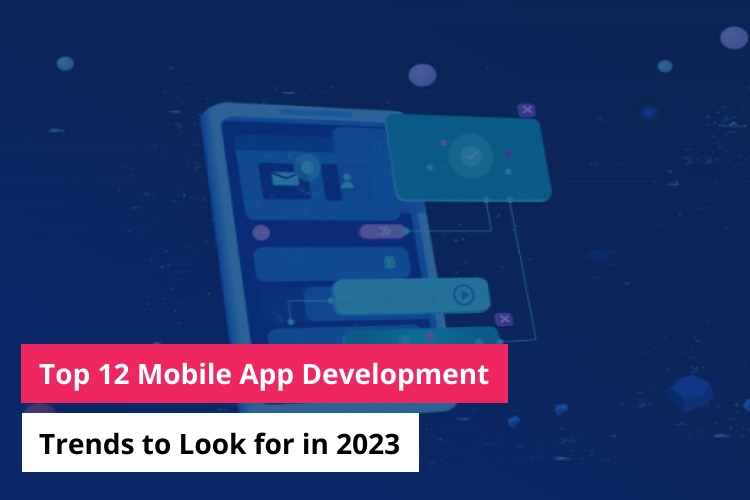Top 12 Mobile App Development Trends to Look for in 2023

Mobile apps have revolutionized the way we live, work, and play. From ordering groceries to managing finances, mobile apps have made our lives more convenient and connected. As we look toward the future, mobile app development trends are constantly evolving and shaping the way we interact with our devices.
In 2023, we can expect to see a continued focus on user experience, as well as the integration of emerging technologies like artificial intelligence, 5G networks, and blockchain. Mobile apps will become even more personalized, interactive, and engaging, offering users a seamless and intuitive experience.
In this blog, we will explore the top 12 mobile app development trends to look out for in 2023. From instant apps and cloud-based apps to gamification and in-app advertising, we will examine the latest developments and trends shaping the mobile app landscape. Whether you are a mobile app developer or just interested in staying up-to-date on the latest tech trends, this blog is for you. So, buckle up and get ready to explore the future of mobile app development!
AI-Powered Personal Assistants: 
One of the most prominent trends in mobile app development is the use of artificial intelligence (AI) and machine learning (ML) to create personal assistants that can interact with users in natural and intuitive ways. These assistants can understand user preferences, provide personalized recommendations, automate tasks, and enhance user experience. For example, shopping apps could use AI-powered chatbots to help customers find what they are looking for, rather than making them browse through endless categories and products. AI can also be used to create more engaging and creative content for users, such as by generating stories, poems, songs, or images.
AI-powered personal assistants are not only convenient and helpful for users, but also beneficial for businesses. They can help increase customer satisfaction, retention, and loyalty, as well as reduce operational costs and increase revenue. According to a report by Juniper Research, global spending on AI-powered chatbots is expected to reach $9.4 billion by 2024. Moreover, according to a survey by Salesforce, 51% of marketing leaders are already using AI in their mobile apps.
Some examples of successful AI-powered personal assistants in mobile apps are:
- Google Assistant: A virtual assistant that can perform various tasks and answer questions using natural language processing and voice recognition.
- Siri: Apple’s voice-controlled personal assistant that can help users with various tasks such as making calls, sending messages, setting reminders, playing music, etc.
- Alexa: Amazon’s cloud-based voice service that can be integrated with various devices and apps to provide information, entertainment, shopping, smart home control, etc.
- Cortana: Microsoft’s digital assistant that can help users with various tasks such as scheduling meetings, sending emails, checking the weather, etc.
- Replika: An app that creates a personalized chatbot that can act as a friend and companion for users.
Augmented Reality (AR) Games and Apps:
Another trend that is gaining popularity in mobile app development is augmented reality (AR), which is a technology that overlays digital elements in the real world. AR can create immersive and realistic experiences for users, such as by allowing them to see their pet in a virtual room or play a game involving AR characters. AR can also be used for educational, entertainment, or marketing purposes, such as by providing interactive tutorials, enhancing live events, or showcasing products in 3D.
AR games and apps are becoming more accessible and affordable for users and developers alike. With the advancement of AR-capable devices such as smartphones and tablets, as well as AR platforms such as ARKit and ARCore, developers can create more innovative and engaging AR experiences for users. According to a report by Statista, the global market size of AR games is expected to reach $284.93 billion by 2023. Moreover, according to a survey by Deloitte, 88% of mid-market companies have already implemented some form of AR or VR technology in their business.
Some examples of successful AR games and apps are:
- Pokemon Go: A location-based game that allows users to catch and battle virtual creatures called Pokemon in the real world using their smartphone camera.
- IKEA Place: An app that allows users to virtually place IKEA furniture in their home using their smartphone camera.
- Snapchat: A social media app that allows users to apply various filters and effects to their photos and videos using AR technology.
- Google Translate: An app that allows users to translate text from one language to another using their smartphone camera.
- Mondly: An app that allows users to learn new languages using AR technology.
5G Network: The Next Generation of Connectivity Takes Center Stage 
The 5G network is the fifth generation of mobile networks that is designed to provide faster and more reliable connectivity for mobile devices. It is a revolutionary technology that promises to transform the way we connect to the internet, communicate, and use mobile devices.
Compared to the previous generations of mobile networks, 5G offers significantly faster speeds, lower latency, and higher bandwidth. This means that users can download and upload data at lightning-fast speeds, stream high-quality videos with no buffering, and experience real-time gaming and virtual reality with no lag.
The 5G network is expected to have a significant impact on many industries, including healthcare, transportation, education, and entertainment. For example, it could enable remote surgeries, autonomous driving, virtual classrooms, and immersive entertainment experiences.
IoT-enabled Mobile Apps Will Revolutionize the Way We Live:
The Internet of Things (IoT) refers to the interconnectivity of physical devices, vehicles, buildings, and other objects embedded with sensors, software, and network connectivity that allow them to collect and exchange data. In 2023, we can expect to see more mobile apps leveraging IoT technology to provide users with more personalized and intelligent experiences.
IoT technology has the potential to transform the way we interact with the world around us. With IoT-enabled mobile apps, users can control their home appliances, track their health and fitness data, and even monitor their car’s performance, all from their smartphones.
IoT-enabled mobile apps can also provide users with real-time insights and notifications. For example, a smart thermostat app can use data from IoT sensors to adjust the temperature in a user’s home automatically, while a health app can use data from IoT sensors to provide users with personalized recommendations based on their activity levels.
The Rise of Instant Apps in Mobile App Development:
Instant Apps are a trend in mobile app development that allows users to experience an app’s functionality without having to download and install the full app. Instant Apps are designed to be lightweight, fast, and responsive, providing a seamless user experience.
The main advantage of Instant Apps is that users can try out an app before committing to downloading and installing it on their device. This feature is particularly useful for users who have limited storage space on their devices or are hesitant to download an app that they may only use once or twice.
Instant Apps are also beneficial for app developers because they allow developers to reach a wider audience by providing a low-friction way for users to access their app’s functionality. Additionally, Instant Apps can be an effective marketing tool for app developers because they allow users to discover and try out their app’s features without any upfront commitment.
To develop an Instant App, developers need to modularize their app’s code into smaller, more manageable chunks that can be downloaded and run on demand. This modular approach requires careful planning and design, but it can result in a more efficient and responsive app experience.
Cross-Platform Development: Breaking Platform Barriers
Cross-Platform Development is a trend in mobile app development that allows developers to create apps that can run on multiple platforms, such as iOS, Android, and Windows. Cross-platform development frameworks, such as React Native, Xamarin, and Flutter, enable developers to write code once and deploy it across multiple platforms, saving time and resources.
One of the key advantages of Cross-Platform Development is that it enables developers to reach a wider audience with their apps. According to a report by Statista, as of 2021, there were 3.8 billion smartphone users worldwide, with Android and iOS devices accounting for the vast majority of the market share. By developing cross-platform apps, developers can target both iOS and Android users without having to create separate apps for each platform.
Another advantage of Cross-Platform Development is that it can lead to faster time-to-market for apps. Since developers can write code once and deploy it across multiple platforms, they can save time and resources by avoiding the need to write separate codebases for each platform.
Cross-Platform Development also allows for easier app maintenance and updates since developers only need to update the codebase once for all platforms. This can result in a more efficient development process and a better user experience for app users.
According to a report by MarketsandMarkets, the cross-platform development market is expected to grow from $11.9 billion in 2021 to $43.2 billion by 2026, at a CAGR of 29.9% during the forecast period. This growth is driven by the increasing demand for cost-effective app development solutions and the rising popularity of mobile devices worldwide.
Efficient and Personalized Customer Service: The Power of Chatbots in Mobile App Development
Chatbots are computer programs designed to simulate conversation with human users through text or voice interactions. Chatbots have become increasingly popular in mobile app development due to their ability to provide efficient and personalized customer service experiences, without the need for human intervention.
One of the main advantages of Chatbots is that they can save time and resources for businesses by automating customer service interactions.
Chatbots can also improve the user experience by providing 24/7 availability and instant responses to user queries. This can result in higher customer satisfaction rates and increased customer loyalty. According to a report by Mindbowser, 64% of consumers believe that 24/7 availability is Chatbots’ top benefit.
Another advantage of Chatbots is their ability to collect data and provide insights into customer behavior and preferences. Chatbots can analyze user interactions and provide businesses with valuable insights into customer needs and preferences. This can help businesses make data-driven decisions and improve their products and services.
According to a report by Grand View Research, the global Chatbot market size was valued at $17.17 billion in 2020 and is expected to grow at a CAGR of 23.5% from 2021 to 2028. The increasing adoption of AI and natural language processing technologies, coupled with the rising demand for automated customer service interactions, is driving the growth of the Chatbot market.
Blockchain’s Secure and Transparent Data Solutions:
Blockchain is a distributed digital ledger that records transactions in a secure and tamper-proof manner. Blockchain technology has become increasingly popular in mobile app development due to its ability to provide a secure and transparent way to store and exchange data.
One of the main advantages of Blockchain technology is its security. The decentralized nature of Blockchain means that there is no single point of failure, making it difficult for hackers to compromise the system.
Another advantage of Blockchain is its ability to provide transparency and immutability. Blockchain records transactions in a way that is transparent and accessible to all parties involved, making it easier to verify the authenticity of data. This can be especially important in industries such as healthcare and finance, where data accuracy and security are critical.
Blockchain technology can also provide more efficient and cost-effective solutions for data management. According to a report by IBM, Blockchain can reduce data management costs by up to 50%, by eliminating the need for intermediaries and reducing the risk of errors and fraud.
In mobile app development, Blockchain technology can be used for a variety of purposes, such as secure data storage, identity verification, and supply chain management. As the use cases for Blockchain technology continue to expand, it is likely to become an increasingly important trend in mobile app development.
Unleashing the Power of Cloud-Based Apps in Mobile App Development:
Cloud-based apps refer to mobile applications that store and process data on remote servers, rather than on the user’s device. This allows for seamless syncing of data across multiple devices and enables users to access their data from anywhere with an internet connection.
One of the main advantages of cloud-based apps is their scalability. The cloud-based infrastructure allows for quick and easy scaling up or down of resources based on demand, allowing mobile app developers to manage sudden spikes in traffic or user activity.
Cloud-based apps also offer greater flexibility and accessibility, as they can be accessed from a variety of devices and locations. This can be especially important for businesses that have remote or distributed teams, as it enables employees to access important data and information from anywhere.
According to a report by MarketsandMarkets, the global cloud computing market size is expected to grow from $371.4 billion in 2020 to $832.1 billion by 2025, at a CAGR of 17.5% during the forecast period. This growth is being driven by the increasing adoption of cloud-based technologies across industries.
In mobile app development, cloud-based apps can be used for a variety of purposes, such as data storage, processing, and analytics. As the need for more scalable and flexible mobile apps continues to grow, it is likely that cloud-based apps will become an increasingly important trend in the mobile app development industry.
The Future of Payments: The Rise of Mobile Wallets in Mobile App Development
Mobile wallets are digital wallets that allow users to store, manage, and transact their money using their mobile devices. These wallets eliminate the need for physical cash or cards and provide a convenient and secure way for users to make payments on the go.
One of the main advantages of mobile wallets is their convenience. Users can easily store multiple payment methods, such as credit or debit cards, in their mobile wallets, and make payments with just a few taps on their smartphones. This can be especially useful for users who frequently make online purchases or transactions.
Mobile wallets also offer enhanced security features such as fingerprint or facial recognition, two-factor authentication, and encryption, which provide a higher level of protection against fraud and identity theft.
In mobile app development, mobile wallets can be integrated with other mobile applications, such as e-commerce platforms, banking apps, and ride-sharing apps, to provide a seamless payment experience for users. As the demand for more convenient and secure payment methods continues to grow, mobile wallets are likely to become an increasingly important trend in the mobile app development industry.
Leveling Up User Engagement: The Power of Gamification in Mobile App Development
Gamification involves incorporating game elements, such as points, badges, and leaderboards, into non-game contexts to make them more engaging and interactive. In mobile app development, gamification can be used to increase user engagement, retention, and motivation by making the app experience more fun and rewarding.
This can be particularly effective in educational, fitness, and productivity apps, where users may need extra motivation to achieve their goals. According to a report by Technavio, the global gamification market is expected to grow at a CAGR of over 27% during the forecast period of 2021-2025.
As the demand for more engaging and interactive mobile apps continues to grow, gamification is likely to become an increasingly important trend in the mobile app development industry. By incorporating game elements into mobile apps, developers can create a more immersive and enjoyable user experience, leading to higher user engagement and retention rates.
Increased Adoption of In-App Advertising in Mobile App Development:
In-app advertising is a form of mobile advertising that involves displaying ads within mobile applications. These ads can take the form of banner ads, interstitial ads, native ads, and rewarded ads, and can be targeted based on user behavior and demographics.
In-app advertising can provide a significant revenue stream for mobile app developers, as advertisers are willing to pay for access to the large and engaged audiences that mobile apps attract. According to a report by Statista, global in-app advertising revenue is expected to reach $201 billion by 2024.
In addition to providing revenue for developers, in-app advertising can also benefit users by providing them with relevant and useful information, such as promotions or discounts for products or services they are interested in.
However, it’s important for developers to strike a balance between monetization and user experience. Too many ads or irrelevant ads can lead to a negative user experience and may ultimately result in users abandoning the app.
As the demand for mobile advertising continues to grow, in-app advertising is likely to become an increasingly important trend in the mobile app development industry. By incorporating in-app advertising in a strategic and user-friendly way, developers can create a successful and profitable mobile app.
Wrapping it Up:
As we’ve explored the top 12 mobile app development trends for 2023, it’s clear that staying up-to-date on emerging technologies is crucial to creating successful and engaging apps. From artificial intelligence and 5G networks to instant apps and gamification, the mobile app landscape is evolving rapidly.
Partnering with a trusted software development company like Imenso Software can help you stay ahead of the curve and bring your app idea to life. With expertise in mobile app development and a commitment to delivering high-quality and innovative solutions, we can help you create an app that leverages the latest trends and technologies to achieve your business goals.
So, whether you’re a start-up or a full-fledged business, it’s an exciting time to be part of the mobile app revolution. Let’s work together to create something amazing and take your business to the next level. Don’t hesitate to reach out to us to discuss your project and how we can help you turn your vision into a successful mobile app.
Similar Posts

Agile vs Waterfall software development Methodology
Any software development company has to decide about the methodology suited for their projects. There are two mighty and time tested choices, respectively as waterfall and agile software development methodology. To be precise, both are far from opposed to each other as antagonist opposites. But these two methodologies clearly shows the evolution of the software […]...

Effective Ways Offshore Software Development Companies Improve Business Security
Software development companies have grown sporadically over the years, likewise the villain teams of expert hackers who work around the clock trying to infiltrate processes. That leads to the implementation of extra measures on already existing security processes in the software development world. ...

NFT Game Development Guide: All You Need to Know
The history of online games goes back to the first computer game, NIMROD, to multiplayer role-playing games like Dungeons and Dragons. The madness for video games hasn’t ever faded; instead, it keeps expanding....







